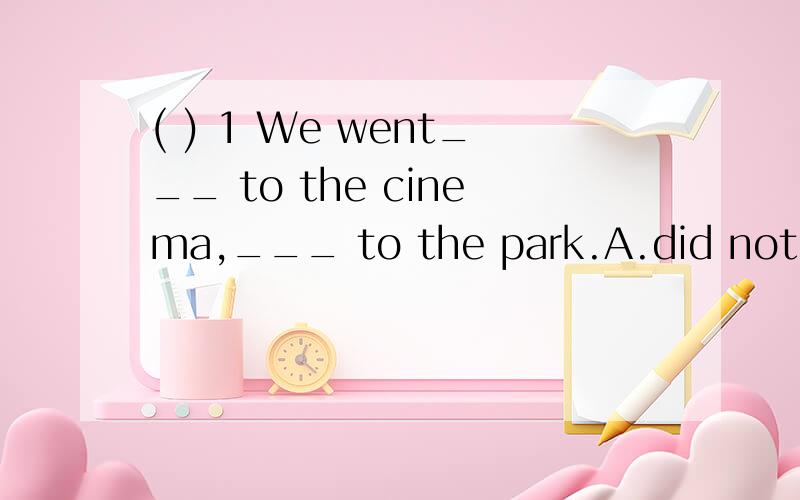( ) 1 We went___ to the cinema,___ to the park.A.did not; / B.not; but C.either; or D.both; and
来源:学生作业帮助网 编辑:作业帮 时间:2024/10/04 16:37:19

x��SKo�@�+�[+��z!%��AA
�
������l�X
�"�H
���w�K���O�
��)BU/�T���Y�|�Gr���yIޤȧTF��bD��(Eަ3��q������)�N�LV�9��C�L^I�4~��l���Y�(L�d$�=ïy2P(�� 9�3�n��
��7�
%����fwP ����[8
�v
Ϋ��+���177�y6��V�:3���1G���B����u��s�9���) ����E�+]ް�Z\=c�1��0}�e���o^�Ju���� Q0@N�
źW\�0�f� 7�
+#�v��^��)
���A�l�>*C|����폜�{�J�-��٣I[�#ÂI��&bP�'H�_N�k�
�-*�P�����@˂k0�
��gd����[�w�I�aa��%��N��/D����m@R�r+�\UvB�ݦb�b��"�������i�U�z�yo�n�B(ol���9[����;�ew�wl�c�k|ݶ0ް�Vq+���W�Y�r>o\B�LL�Wa� �+��� ��|b�6�"�FB r�Lt��D��������\5G�
( ) 1 We went___ to the cinema,___ to the park.A.did not; / B.not; but C.either; or D.both; and
( ) 1 We went___ to the cinema,___ to the park.
A.did not; / B.not; but C.either; or D.both; and
( ) 1 We went___ to the cinema,___ to the park.A.did not; / B.not; but C.either; or D.both; and
本题选B
首先,一个否定句,助动词和not都要放在动词之前,且动词要用原型,所以A排除掉.
其次,选B意思是:我们不是去了电影院,而是去了公园.用了not和but连接了两个动词不定式.
第三,either or 意思是“要么……要么”,表示两者任选其一.但是句子中went是过去时,说明事情已经在过去发生过了,所以“我们去了哪里”应该是已经知道了,而不能用选择句型.
第四,both and表示两者兼顾,“我们去了电影院的同时也去了公园” ,显然对于没有分身术的你来说是不可能的,所以也要排除!
选择题,答案很多都是这么一步一步排除得来的,
选B
B
( ) 1 We went___ to the cinema,___ to the park.A.did not; / B.not; but C.either; or D.both; and
Next to the bank is a___(shoe)shop.Jack went___(shop)in the market.
( )We knew nothing about the fire until the fire alarm went___.A.off B.on C.out D.over
He went___ (到国外)last year.
1.We should___(exercise)very often so that we can be strong and healthy 2.I went___(shop)with my mum yesterday.We____(buy)a lot of things.3.She is the youngest and____(thin)person in her family.4.Chongqing is___(large)than the other cities in China.5
yes we to to to
what do we -----to buy?we---to---
we used to work to
we were burn to
we will ready to
We will to happiness
We are happy to
we are here to
We 'bout to
We want to learn____art
we are here to
we have to
we stay fresh to